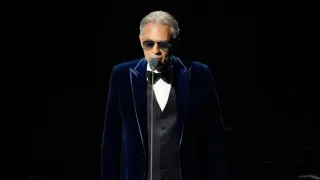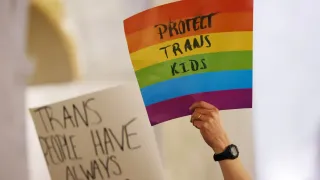July 10, 2020
AP: After Lobbying, Catholic Church Won $1.4B in Virus Aid
Reese Dunklin and Michael Rezendes READ TIME: 9 MIN.
The U.S. Roman Catholic Church used a special and unprecedented exemption from federal rules to amass at least $1.4 billion in taxpayer-backed coronavirus aid, with many millions going to dioceses that have paid huge settlements or sought bankruptcy protection because of clergy sexual abuse cover-ups.
The church's haul may have reached -- or even exceeded -- $3.5 billion, making a global religious institution with more than a billion followers among the biggest winners in the U.S. government's pandemic relief efforts, an Associated Press analysis of federal data released this week found.
Houses of worship and faith-based organizations that promote religious beliefs aren't usually eligible for money from the U.S. Small Business Administration. But as the economy plummeted and jobless rates soared, Congress let faith groups and other nonprofits tap into the Paycheck Protection Program, a $659 billion fund created to keep main street open and Americans employed.
By aggressively promoting the payroll program and marshaling resources to help affiliates navigate its shifting rules, Catholic dioceses, parishes, schools and other ministries have so far received approval for at least 3,500 forgivable loans, AP found.
The Archdiocese of New York, for example, received 15 loans worth at least $28 million just for its top executive offices. Its iconic St. Patrick's Cathedral on Fifth Avenue was approved for at least $1 million.
In Orange County, California, where a sparkling glass cathedral estimated to cost over $70 million recently opened, diocesan officials working at the complex received four loans worth at least $3 million.
And elsewhere, a loan of at least $2 million went to the diocese covering Wheeling-Charleston, West Virginia, where a church investigation revealed last year that then-Bishop Michael Bransfield embezzled funds and made sexual advances toward young priests.
Simply being eligible for low-interest loans was a new opportunity. But the church couldn't have been approved for so many loans -- which the government will forgive if they are used for wage, rent and utilities -- without a second break.
Religious groups persuaded the Trump administration to free them from a rule that typically disqualifies an applicant with more than 500 workers. Without this preferential treatment, many Catholic dioceses would have been ineligible because -- between their head offices, parishes and other affiliates -- their employees exceed the 500-person cap.
"The government grants special dispensation, and that creates a kind of structural favoritism," said Micah Schwartzman, a University of Virginia law professor specializing in constitutional issues and religion who has studied the Paycheck Protection Program. "And that favoritism was worth billions of dollars."
The amount that the church collected, between $1.4 billion and $3.5 billion, is an undercount. The Diocesan Fiscal Management Conference, an organization of Catholic financial officers, surveyed members and reported that about 9,000 Catholic entities received loans. That is nearly three times the number of Catholic recipients AP could identify.
AP couldn't find more Catholic beneficiaries because the government's data, released after pressure from Congress and a lawsuit from news outlets including the AP, didn't name recipients of loans under $150,000 -- a category in which many smaller churches would fall. And because the government released only ranges of loan amounts, it wasn't possible to be more precise.
Even without a full accounting, AP's analysis places the Catholic Church among the major beneficiaries in the Paycheck Protection Program, which also has helped companies backed by celebrities, billionaires, state governors and members of Congress.
The program was open to all religious groups, and many took advantage. Evangelical advisers to President Donald Trump, including his White House spiritual czar, Paula White-Cain, also received loans.
___
'TRULY IN NEED'
There is no doubt that state shelter-in-place orders disrupted houses of worship and businesses alike.
Masses were canceled, even during the Holy Week and Easter holidays, depriving parishes of expected revenue and contributing to layoffs in some dioceses. Some families of Catholic school students are struggling to make tuition payments. And the expense of disinfecting classrooms once classes resume will put additional pressure on budgets.
But other problems were self-inflicted. Long before the pandemic, scores of dioceses faced increasing financial pressure because of a dramatic rise in recent clergy sex-abuse claims.
The scandals that erupted in 2018 reverberated throughout the world. Pope Francis ordered the former archbishop of Washington, Cardinal Theodore McCarrick, to a life of "prayer and penance" following allegations he abused minors and adult seminarians. And a damning grand jury report about abuse in six Pennsylvania dioceses revealed bishops had long covered for predator priests, spurring investigations in more than 20 other states.
As the church again reckoned with its longtime crisis, abuse reports tripled during the year ending June 2019 to a total of nearly 4,500 nationally. Meanwhile, dioceses and religious orders shelled out $282 million that year – up from $106 million just five years earlier. Most of that went to settlements, in addition to legal fees and support for offending clergy.
Loan recipients included about 40 dioceses that have spent hundreds of millions of dollars in the past few years paying victims through compensation funds or bankruptcy proceedings. AP's review found that these dioceses were approved for about $200 million, though the value is likely much higher.
One was the New York Archdiocese. As a successful battle to lift the statute of limitations on the filing of child sexual abuse lawsuits gathered steam, Cardinal Timothy Dolan established a victim compensation fund in 2016. Since then, other dioceses have established similar funds, which offer victims relatively quick settlements while dissuading them from filing lawsuits.
Spokesperson Joseph Zwilling said the archdiocese simply wanted to be "treated equally and fairly under the law." When asked about the waiver from the 500-employee cap that religious organizations received, Zwilling deferred to the U.S. Conference of Catholic Bishops.
A spokesperson for the bishops' conference acknowledged its officials lobbied for the paycheck program, but said the organization wasn't tracking what dioceses and Catholic agencies received.
"These loans are an essential lifeline to help faith-based organizations to stay afloat and continue serving those in need during this crisis," spokesperson Chieko Noguchi said in a written statement. According to AP's data analysis, the church and all its organizations reported retaining at least 407,900 jobs with the money they were awarded.
Noguchi also wrote the conference felt strongly that "the administration write and implement this emergency relief fairly for all applicants."
Not every Catholic institution sought government loans. The Ukrainian Catholic Eparchy based in Stamford, Connecticut, told AP that even though its parishes experienced a decline in donations, none of the organizations in its five-state territory submitted applications.
Deacon Steve Wisnowski, a financial officer for the eparchy, said pastors and church managers used their rainy-day savings and that parishioners responded generously with donations. As a result, parishes "did not experience a severe financial crisis."
Wisnowski said his superiors understood the program was for "organizations and businesses truly in need of assistance."
___
LOBBYING FOR A BREAK
The law that created the Paycheck Protection Program let nonprofits participate, as long as they abided by SBA's "affiliation rule." The rule typically says that only businesses with fewer than 500 employees, including at all subsidiaries, are eligible.
Lobbying by the church helped religious organizations get an exception.
The Catholic News Service reported that the bishops' conference and several major Catholic nonprofit agencies worked throughout the week of March 30 to ensure that the "unique nature of the entities would not make them ineligible for the program" because of how SBA defines a "small" business. Those conversations came just days after President Trump signed the $2 trillion Coronavirus Aid, Relief, and Economic Security Act, which included the Paycheck Protection Program.
In addition, federal records show the Los Angeles archdiocese, whose leader heads the bishops' conference, paid $20,000 to lobby the U.S. Senate and House on "eligibility for non-profits" under the CARES Act. The records also show that Catholic Charities USA, a social service arm of the church with member agencies in dioceses across the country, paid another $30,000 to lobby on the act and other issues.
In late April, after thousands of Catholic institutions had secured loans, several hundred Catholic leaders pressed for additional help on a call with President Trump. During the call, Trump underscored the coming presidential election and touted himself as the candidate best aligned with religious conservatives, boasting he was the "best (president) the Catholic church has ever seen," according to Crux, an online publication that covers church-related news.
The lobbying paid off.
Catholic Charities USA and its member agencies were approved for about 110 loans worth between $90 million and $220 million at least, according to the data.
In a statement, Catholic Charities said: "Each organization is a separate legal entity under the auspices of the bishop in the diocese in which the agency is located. CCUSA supports agencies that choose to become members, but does not have any role in their daily operations or governance."
The Los Angeles archdiocese told AP in a survey that reporters sent before the release of federal data that 247 of its 288 parishes -- and all but one of its 232 schools -- received loans. The survey covered more than 180 dioceses and eparchies.
Like most dioceses, Los Angeles wouldn't disclose its total dollar amount. While the federal data doesn't link Catholic recipients to their home dioceses, AP found 37 loans to the archdiocese and its affiliates worth between $9 million and $23 million, including one for its downtown cathedral.
In 2014, the archdiocese paid a record $660 million to settle sex abuse claims from more than 500 victims. Spokespeople for Los Angeles Archbishop Jose M. Gomez did not respond to additional questions about the archdiocese's finances and lobbying.
In program materials, SBA officials said they provided the affiliation waiver to religious groups in deference to their unique organizational structure, and because the public health response to slow the coronavirus' spread disrupted churches just as it did businesses.
SBA did not respond to written questions and requests for comment.
Meanwhile, some legal experts say that the special consideration the government gave faith groups in the loan program has further eroded the wall between church and state provided in the First Amendment. With that erosion, religious groups that don't pay taxes have gained more access to public money, said Marci Hamilton, a University of Pennsylvania professor and attorney who has represented clergy abuse victims on constitutional issues during bankruptcy proceedings.
"At this point, the argument is you're anti-religious if in fact you would say the Catholic Church shouldn't be getting government funding," Hamilton said.
___
CASHING IN FAST
After its lobbying blitz, the Catholic Church worked with parishes and schools to access the money.
Many dioceses -- from large ones such as the Archdiocese of Boston to smaller ones such as the Diocese of La Crosse, Wisconsin -- assembled how-to guides to help their affiliates apply. The national Catholic fiscal conference also hosted multiple webinars with legal and financial experts to help coach along local leaders.
Federal data show that the bulk of the church's money was approved during the loan program's first two weeks. That's when demand for the first-come, first-served assistance was so high that the initial $349 billion was quickly exhausted, shutting out many local businesses.
Overall, nearly 500 loans approved to Catholic entities exceeded $1 million each. The AP found that at least eight hit the maximum range of $5 million to $10 million. Many of the listed recipients were the offices of bishops, headquarters of leading religious orders, major churches, schools and chapters of Catholic Charities.
Also among recipients was the Saint Luke Institute. The Catholic treatment center for priests accused of sexual abuse and those suffering from other disorders received a loan ranging from $350,000 to $1 million. Based in Silver Spring, Maryland, the institute has at times been a way station for priests accused of sexual abuse who returned to active ministry only to abuse again.
Perhaps nothing illustrates the church's aggressive pursuit of funds better than four dioceses that sued the federal government to receive loans, even though they entered bankruptcy proceedings due to mounting clergy sex-abuse claims. Small Business Administration rules prohibit loans to applicants in bankruptcy.
The Archdiocese of Santa Fe, New Mexico -- once home to a now-closed and notorious treatment center for predator priests -- prevailed in court, clearing the way for its administrative offices to receive nearly $1 million. It accused the SBA of overreaching by blocking bankruptcy applications when Congress didn't spell that out.
Yet even when a diocese has lost in bankruptcy court, or its case is pending, its affiliated parishes, schools and other organizations remain eligible for loans.
On the U.S. territory of Guam, well over 200 clergy abuse lawsuits led church leaders in the tiny Archdiocese of Agana to seek bankruptcy protection, as they estimated at least $45 million in liabilities. Even so, the archdiocese's parishes, schools and other organizations have received at least $1.7 million as it sues the SBA for approval to get a loan for its headquarters, according to bankruptcy filings.
The U.S. church may have a troubling record on sex abuse, but Bishop Lawrence Persico of Erie, Pennsylvania, pushed back on the idea that dioceses should be excluded from the government's rescue package. Approximately 80 organizations within his diocese received loans worth $10.3 million, the diocese said, with most of the money going to parishes and schools.
Persico pointed out that church entities help feed, clothe and shelter the poor -- and in doing so keep people employed.
"I know some people may react with surprise that government funding helped support faith-based schools, parishes and dioceses," he said. "The separation of church and state does not mean that those motivated by their faith have no place in the public square."
___
Data journalist Justin Myers contributed from Chicago.






